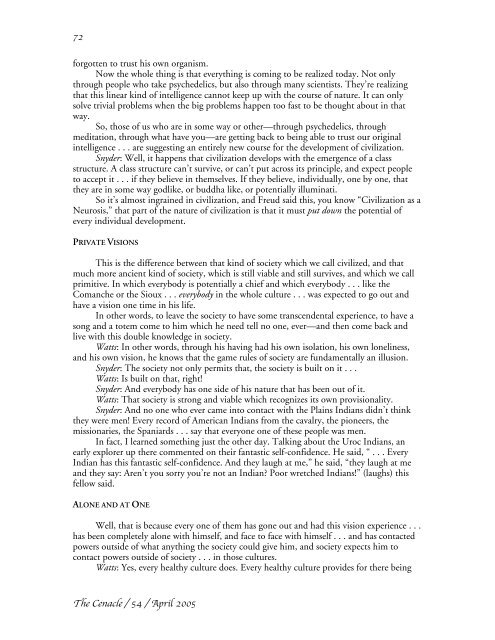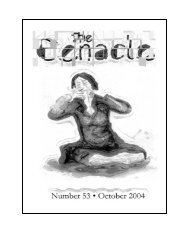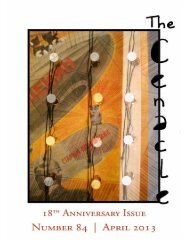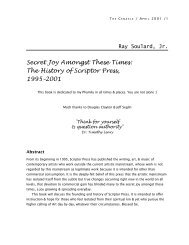Scriptor Press - The ElectroLounge
Scriptor Press - The ElectroLounge
Scriptor Press - The ElectroLounge
Create successful ePaper yourself
Turn your PDF publications into a flip-book with our unique Google optimized e-Paper software.
72<br />
forgotten to trust his own organism.<br />
Now the whole thing is that everything is coming to be realized today. Not only<br />
through people who take psychedelics, but also through many scientists. <strong>The</strong>y’re realizing<br />
that this linear kind of intelligence cannot keep up with the course of nature. It can only<br />
solve trivial problems when the big problems happen too fast to be thought about in that<br />
way.<br />
So, those of us who are in some way or other—through psychedelics, through<br />
meditation, through what have you—are getting back to being able to trust our original<br />
intelligence . . . are suggesting an entirely new course for the development of civilization.<br />
Snyder: Well, it happens that civilization develops with the emergence of a class<br />
structure. A class structure can’t survive, or can’t put across its principle, and expect people<br />
to accept it . . . if they believe in themselves. If they believe, individually, one by one, that<br />
they are in some way godlike, or buddha like, or potentially illuminati.<br />
So it’s almost ingrained in civilization, and Freud said this, you know “Civilization as a<br />
Neurosis,” that part of the nature of civilization is that it must put down the potential of<br />
every individual development.<br />
PRIVATE VISIONS<br />
This is the difference between that kind of society which we call civilized, and that<br />
much more ancient kind of society, which is still viable and still survives, and which we call<br />
primitive. In which everybody is potentially a chief and which everybody . . . like the<br />
Comanche or the Sioux . . . everybody in the whole culture . . . was expected to go out and<br />
have a vision one time in his life.<br />
In other words, to leave the society to have some transcendental experience, to have a<br />
song and a totem come to him which he need tell no one, ever—and then come back and<br />
live with this double knowledge in society.<br />
Watts: In other words, through his having had his own isolation, his own loneliness,<br />
and his own vision, he knows that the game rules of society are fundamentally an illusion.<br />
Snyder: <strong>The</strong> society not only permits that, the society is built on it . . .<br />
Watts: Is built on that, right!<br />
Snyder: And everybody has one side of his nature that has been out of it.<br />
Watts: That society is strong and viable which recognizes its own provisionality.<br />
Snyder: And no one who ever came into contact with the Plains Indians didn’t think<br />
they were men! Every record of American Indians from the cavalry, the pioneers, the<br />
missionaries, the Spaniards . . . say that everyone one of these people was men.<br />
In fact, I learned something just the other day. Talking about the Uroc Indians, an<br />
early explorer up there commented on their fantastic self-confidence. He said, “ . . . Every<br />
Indian has this fantastic self-confidence. And they laugh at me,” he said, “they laugh at me<br />
and they say: Aren’t you sorry you’re not an Indian? Poor wretched Indians!” (laughs) this<br />
fellow said.<br />
ALONE AND AT ONE<br />
Well, that is because every one of them has gone out and had this vision experience . . .<br />
has been completely alone with himself, and face to face with himself . . . and has contacted<br />
powers outside of what anything the society could give him, and society expects him to<br />
contact powers outside of society . . . in those cultures.<br />
Watts: Yes, every healthy culture does. Every healthy culture provides for there being<br />
<strong>The</strong> Cenacle / 54 / April 2005









